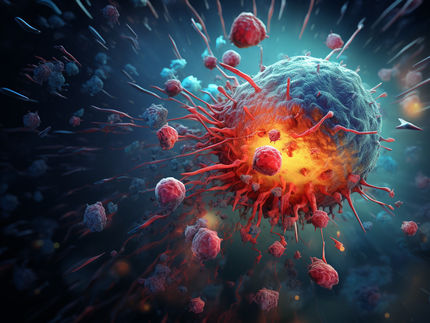Almost two million euros for biotech start-up
BMBF funds DKFZ spin-off for the development of an antibody therapy against pancreatic cancer
Advertisement
Panosome GmbH, a biotech company founded in Heidelberg in 2020, specializes in the development of monoclonal antibodies for a wide range of medical purposes. The basis for this is the VAST technology platform jointly developed by Panosome and DKFZ.
Panosome now wants to use the VAST technology to develop antibodies for the treatment of pancreatic cancer. The Federal Ministry of Education and Research is supporting this project with a total of 1.99 million euros as part of its "KMU-innovativ: Biomedicine" funding measure. Panosome will receive funding totaling 1.55 million euros and the DKFZ 446 thousand euros.
Dr. Jens Brandenburg, Parliamentary State Secretary for Education and Research, emphasizes the importance of start-up funding: "Medical biotechnology is developing at an incredible pace, enabling new treatment approaches. These are urgently needed in the fight against pancreatic cancer in particular. This is because this disease is often only diagnosed at a late stage and previous therapeutic approaches are often unsuccessful. This is why we, as the Federal Ministry of Education and Research, are particularly keen to support small and medium-sized companies that promote technology transfer in biotechnology during drug development. So that the findings from research can also help those affected quickly. Panosome's new treatment approaches are precisely tailored to the individual needs of patients. This is a great opportunity to have a positive impact on the lives of many people."
"The funding from the BMBF is an important milestone for our company," says Prof. Dr. Nina Papavasiliou, Managing Director of Panosome GmbH. "We now have the opportunity to use our technology for the benefit of cancer patients."
Prof. Dr. Dr. h.c. Michael Baumann, Chairman of the Board of the DKFZ, says: "The SME grant to Panosome is a great confirmation of our strategy. Spin-offs have proven to be particularly successful in the transfer from research to application." Ursula Weyrich, Commercial Director of the DKFZ, adds: "The DKFZ therefore encourages, supports and accompanies scientists who want to commercialize their research results as entrepreneurs themselves."
The BMBF-funded CarboVAST project is now focusing on the tumor marker MUC-1, which is overexpressed in 90 percent of all malignant pancreatic tumors. Pancreatic cancer is an increasingly common, highly aggressive form of cancer that often cannot be stopped by currently available forms of therapy.
The VAST technology utilizes African trypanosomes, unicellular parasites known to cause sleeping sickness. The trypanosome surface is covered with many millions of identical proteins, called VSG ("variant surface glycoproteins"), which stimulate the immune system to produce large amounts of neutralizing antibodies.
The highly immunogenic, densely packed VSGs are an excellent carrier for inducing antibodies against almost any molecule. The panosome researchers use dead trypanosomes, which are densely covered with VSG just like the intact pathogen. Using an enzymatic process, the desired antigen - in this case an epitope of MUC-1 - is coupled to the "tips" of the VSG. After vaccination, large quantities of neutralizing antibodies are produced against the coupled antigen.
The isolated antibodies, which recognize MUC-1 on the surface of the pancreatic cancer cells, will then be tested at the DKFZ in various combination therapies against pancreatic cancer. Among other things, the combination with innovative immunotherapeutic procedures developed at the DKFZ will also be tested. Part of the funding will therefore go to the DKFZ.
Not only pancreatic cancer overexpresses MUC-1, but also numerous other solid tumors, such as breast cancer, ovarian cancer and lung cancer. The success of CarboVAST could therefore also benefit patients with other types of cancer.
The aim of the BMBF funding measure "KMU-innovativ: Biomedicine" is to meet, strengthen and expand the interdisciplinary requirements of drug development and the technologies required for this through the exchange of know-how between companies and science. The aim is to sustainably strengthen the innovative capacity of German SMEs in the field of cutting-edge biomedical research and to expand competencies in order to leverage the potential of biomedical innovations and thus make them usable for society and the economy.
Note: This article has been translated using a computer system without human intervention. LUMITOS offers these automatic translations to present a wider range of current news. Since this article has been translated with automatic translation, it is possible that it contains errors in vocabulary, syntax or grammar. The original article in German can be found here.
Other news from the department business & finance
Most read news
More news from our other portals
Something is happening in the life science industry ...
This is what true pioneering spirit looks like: Plenty of innovative start-ups are bringing fresh ideas, lifeblood and entrepreneurial spirit to change tomorrow's world for the better. Immerse yourself in the world of these young companies and take the opportunity to get in touch with the founders.
See the theme worlds for related content
Topic world Antibodies
Antibodies are specialized molecules of our immune system that can specifically recognize and neutralize pathogens or foreign substances. Antibody research in biotech and pharma has recognized this natural defense potential and is working intensively to make it therapeutically useful. From monoclonal antibodies used against cancer or autoimmune diseases to antibody-drug conjugates that specifically transport drugs to disease cells - the possibilities are enormous

Topic world Antibodies
Antibodies are specialized molecules of our immune system that can specifically recognize and neutralize pathogens or foreign substances. Antibody research in biotech and pharma has recognized this natural defense potential and is working intensively to make it therapeutically useful. From monoclonal antibodies used against cancer or autoimmune diseases to antibody-drug conjugates that specifically transport drugs to disease cells - the possibilities are enormous




























































